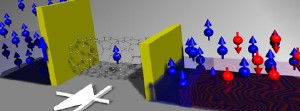Oct 29 2008
Quantum dots (QD)-nanoscale particles that confine electrons and can emit and absorb light-have been studied in lasers, solar paneling, and biomedical therapeutics. Nina Markovic, affiliated faculty member of the Johns Hopkins Institute for NanoBioTechnology (INBT) and assistant professor of physics in the Krieger School of Arts and Sciences, believes this emerging technology will prove important in cancer therapies, energy transmission, and drug delivery.
 Spin-diode with a nanotube quantum dot (QD) poised between a ferromagnetic (blue) and a non-ferromagnetic metal electrode (red and blue). Yellow walls represent contact barriers between the QD and the electrodes. Credit: Christopher Merchant/JHU
Spin-diode with a nanotube quantum dot (QD) poised between a ferromagnetic (blue) and a non-ferromagnetic metal electrode (red and blue). Yellow walls represent contact barriers between the QD and the electrodes. Credit: Christopher Merchant/JHU
"Nanocrystal quantum dots are commercially available," Markovic says, "but we are developing a novel kind of quantum dots using carbon nanotubes."
Carbon nanotubes are long and narrow molecules that look like chicken wire made of carbon atoms. Their fascinating electronic, optical and mechanical properties have been extensively studied in the last ten years. Now that their basic properties are better understood, Markovic explains, the next step is to apply them to biomedical applications such as quantum dot therapeutics or diagnostics.
Recently, Markovic began collaborations with INBT affiliated faculty members Justin Hanes, professor in the Department of Chemical and Biomolecular Engineering and Jennifer Sample from the Applied Physics Laboratory. Together they have been investigating nanotube quantum dots for therapeutic purposes. Markovic and Sample have just been awarded a seed grant from INBT to develop this program.
Specifically, Markovic's group is working on ways to get their nanotube quantum dots to be frequency-specific. This means they will be able to release their contents on demand and be more selectively controlled—an important step in the specific time-release of drugs, and drug delivery regimes.
In addition, Markovic is interested in quantum computing and applying nanotube quantum dot technology to photovoltaic devices. Her group recently studied a film composed of carbon nanotubes and studied their photovoltaic currents in an innovative type of solar cell. Whereas semiconductors are typically used, her idea is to create a structurally different solar cell that may better transmit electrons from the photons it receives from the sun through the photovoltaic effect.
"If light can be more efficiently captured and converted into an electric current, it may revolutionize solar paneling and its use as an efficient renewable energy," Markovic says. [See reference.]
Markovic first became fascinated by quantum mechanics when she took a modern physics course as an undergraduate at the University of Zagreb, Croatia. She says she was drawn to its counterintuitive nature and its elegant mathematical language. After completing a post-doctoral fellowship at Harvard University in 2003, Markovic joined the Hopkins physics faculty. In 2004, she was selected as one of the Alfred P. Sloan Fellows. She received the distinguished National Science Foundation's Faculty Early Career Development Award in 2006, which gave her $500,000 over five years. Markovic enjoys the classroom and teaches thermodynamics and statistical physics. She particularly enjoys teaching the Frontiers of Physics course for non-science majors, which covers all aspects of physics from quantum physics to astrophysics.
To learn more about the Markovic Lab, physics-astronomy.jhu.edu/people/faculty/nina.html.
Reference:
"Effects of diffusion on photocurrent generation in single-walled carbon nanotube films," C. A. Merchant and N. Markovic, Appl. Phys. Lett. 92, 243510 (2008).
Story by Jacob Koskimaki, INBT science writing intern and NanoBio IGERT fellow